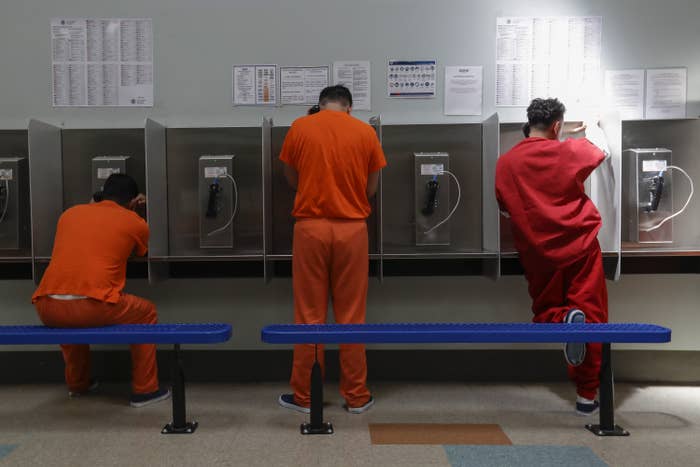
With the signature of Gov. Gavin Newsom this afternoon, California has become the first state to put a comprehensive check on immigration detention. The new law, AB 32, bans the use of private prisons for both immigration detention and criminal incarceration, building on laws passed in 2017 that limited California municipalities from entering into new contracts for the purpose of immigration detention.
Big blow to ICE: Gov. Gavin Newsom just signed a bill phasing out "use of all private, for-profit prisons, including both prisons and immigration detention facilities, in California." What does that mean? ICE is likely to move immigrant detainees in the state to other areas.
California’s leading role in the fight against immigration detention did not occur overnight. In 2017, our organization, Freedom for Immigrants, and other immigrant rights activists pushed to pass the Dignity Not Detention Act and an accompanying state budget amendment. Under the law, California counties and cities cannot extend or enter into new contracts with ICE or private prisons.
Since the passage of the law, four county jails have ended their contracts with ICE. This means that those jails will never incarcerate people for immigration reasons again.
The bill also empowers California’s attorney general to conduct unannounced inspections and release yearly reports on jails that incarcerate immigrants on behalf of ICE. Last year, the attorney general’s office released a report detailing terrible conditions in ICE jails in the state. The report confirmed investigations by advocates and journalists regarding inappropriate and retaliatory use of solitary confinement, substandard and negligent medical care, obstacles to external communication, and barriers to legal representation.
Although the law gave California localities the power to reject immigration detention, it could not prevent private prisons from contracting directly with ICE. In several cases, private prisons entered into new contracts directly with ICE after the termination of their contracts with California towns and counties. Through direct contracting, private prisons could continue to incarcerate immigrants in California.
California’s new ban on private prisons ensures these companies will no longer be able to bypass the will of California voters. Now that Newsom has signed the law, the remaining four privately operated immigrant prisons in the state will have to phase out of their contracts and close.
All four of these private prisons — including the Adelanto Detention Facility and Mesa Verde ICE Processing Center, both operated by Geo Group — have contracts with ICE that terminate in 2020 with the last one expiring in September 2020.
Last year, ICE announced its intention to double current detention levels in California via direct contracting with private prison companies. By outlawing private prisons, California has dealt a serious blow to the Trump administration’s ability to detain immigrants.
As of August this year, the majority of people in ICE custody in the state of California are housed in for-profit detention centers. California mirrors national detention trends, as more than 70% of people in ICE custody nationwide are housed in for-profit jails and prisons.
Yet abolishing the US immigration detention system is not something that can be accomplished by one state alone. To abolish immigration detention, we must defund ICE’s detention infrastructure, increase oversight and accountability of existing contracts, and promote community-based alternatives to detention. Several proposed federal bills — including the Detention Oversight Not Expansion and Dignity for Detained Immigrants acts — propose just that.
However, given the reality of congressional gridlock, states have an obligation to use their authority to limit the growth of a system with a recorded history of abuse.
We have already begun to see proactive responses to mass immigration incarceration in states and municipalities nationwide. In June, Illinois passed a ban on private detention for immigration detention. In August, Minnesota announced its intention to introduce a similar bill. In Aurora, Colorado, town assembly members concerned with substandard medical care in a Geo Group–operated facility are proposing a bill that would require the private prison company to report communicable disease outbreaks to city officials.
ICE detention continues to expand nationwide. Every day, over 50,000 individuals face indefinite detention in facilities with a long history of abuse, including medical neglect, sexual harassment, and barriers to legal access. ICE’s detention system is rapidly expanding in the Southeast US, and recent ICE requests for information suggest that the agency is considering plans for expansion in states ranging from Maryland to Utah.
California proves that states have tools at their disposal to stand by their values and prevent immigration detention facilities from operating within their jurisdictions. From oversight measures to contract moratoriums, states, counties, and cities can help build a country that doesn’t detain immigrants.
Sarah Gardiner is the director of policy at Freedom for Immigrants.
Cynthia Marlene Galaz is the national hotline director and policy monitor at Freedom for Immigrants.

